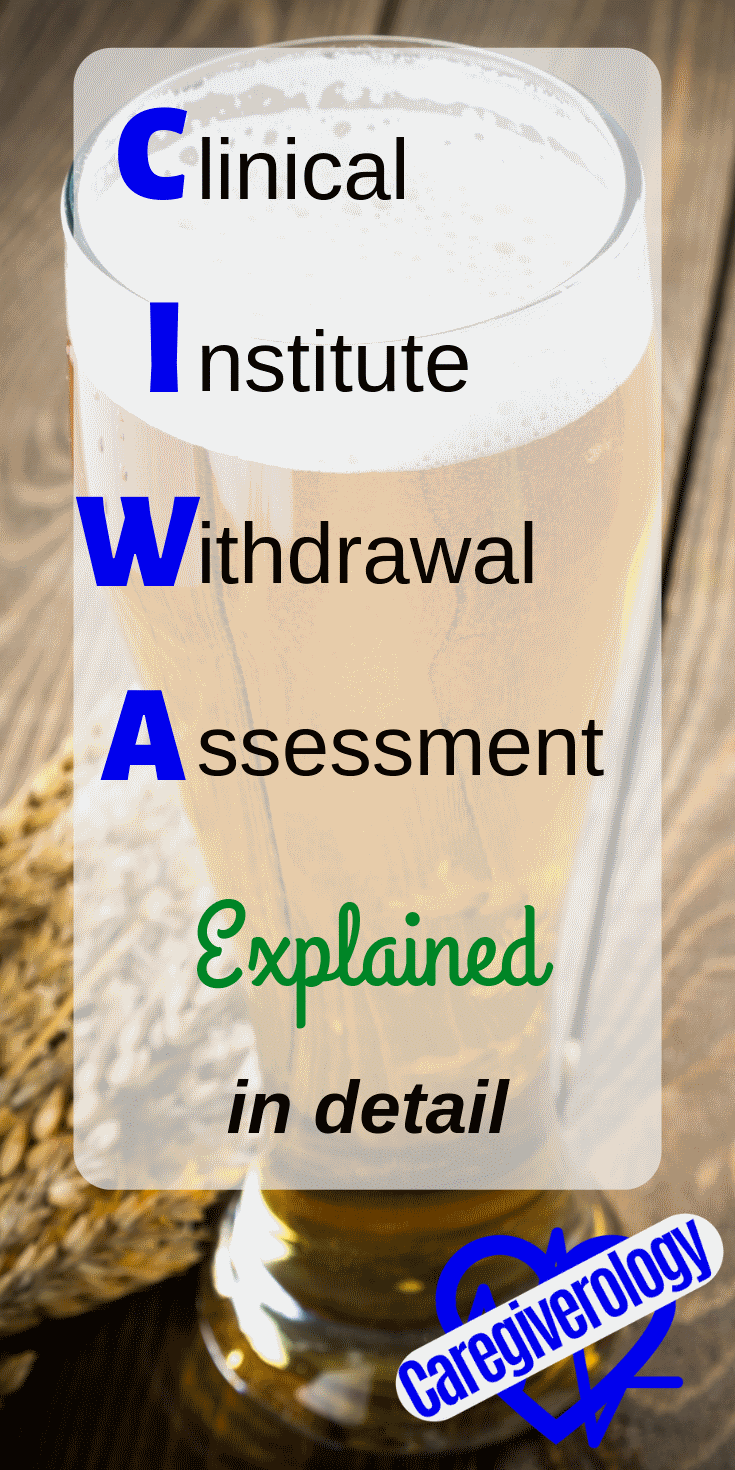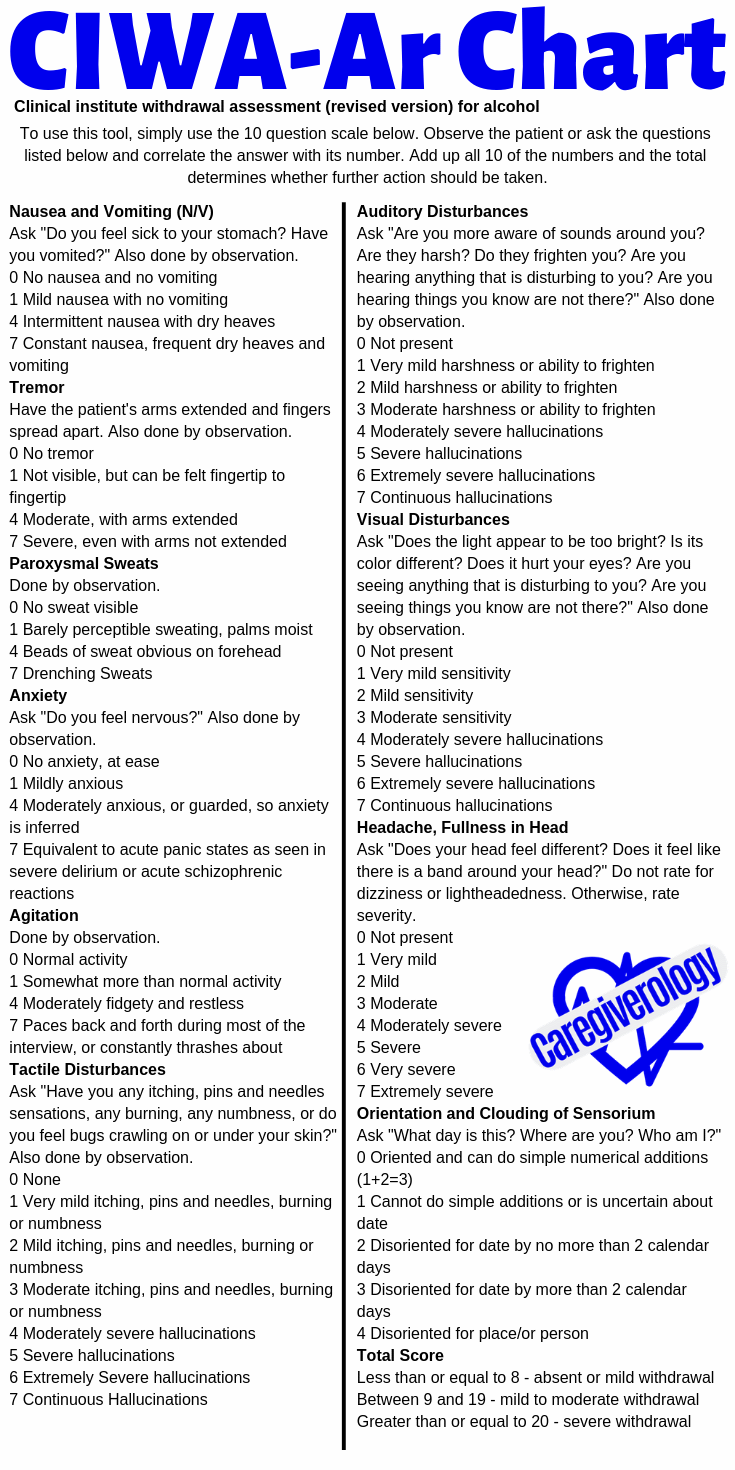CIWA-Ar Explained in Detail

CIWA-Ar is an acronym that stands for clinical institute withdrawal assessment (revised version) for alcohol. It is a tool used to measure withdrawal symptoms for patients who are typically dependent on alcohol. The assessment is often done every four hours while the patient is stable, but more often if the patient starts to show withdrawal symptoms.
To use this tool, simply use the 10 question scale below. Observe the patient or ask the questions listed below and correlate the answer with its number. Add up all 10 of the numbers and the total determines whether further action should be taken. Use the calculator below as needed.
Click here to download and print this chart (pdf)
N/V Tremor Sweats Anxiety Agitation Tactile Auditory Visual Headache Orientation Total Intervention Pin
Nausea and Vomiting (N/V)
Ask "Do you feel sick to your stomach? Have you vomited?" Also done by observation.
0 No nausea and no vomiting
1 Mild nausea with no vomiting
4 Intermittent nausea with dry heaves
7 Constant nausea, frequent dry heaves and vomiting
Tremor
Have the patient's arms extended and fingers spread apart. Also done by observation.
0 No tremor
1 Not visible, but can be felt fingertip to fingertip
4 Moderate, with arms extended
7 Severe, even with arms not extended
Paroxysmal Sweats
Done by observation.
0 No sweat visible
1 Barely perceptible sweating, palms moist
4 Beads of sweat obvious on forehead
7 Drenching Sweats
Anxiety
Ask "Do you feel nervous?" Also done by observation.
0 No anxiety, at ease
1 Mildly anxious
4 Moderately anxious, or guarded, so anxiety is inferred
7 Equivalent to acute panic states as seen in severe delirium or acute schizophrenic reactions
Agitation
Done by observation.
0 Normal activity
1 Somewhat more than normal activity
4 Moderately fidgety and restless
7 Paces back and forth during most of the interview, or constantly thrashes about
Tactile Disturbances
Ask "Have you any itching, pins and needles sensations, any burning, any numbness, or do you feel bugs crawling on or under your skin?" Also done by observation.
0 None
1 Very mild itching, pins and needles, burning or numbness
2 Mild itching, pins and needles, burning or numbness
3 Moderate itching, pins and needles, burning or numbness
4 Moderately severe hallucinations
5 Severe hallucinations
6 Extremely Severe hallucinations
7 Continuous Hallucinations
Auditory Disturbances
Ask "Are you more aware of sounds around you? Are they harsh? Do they frighten you? Are you hearing anything that is disturbing to you? Are you hearing things you know are not there?" Also done by observation.
0 Not present
1 Very mild harshness or ability to frighten
2 Mild harshness or ability to frighten
3 Moderate harshness or ability to frighten
4 Moderately severe hallucinations
5 Severe hallucinations
6 Extremely severe hallucinations
7 Continuous hallucinations
Visual Disturbances
Ask "Does the light appear to be too bright? Is its color different? Does it hurt your eyes? Are you seeing anything that is disturbing to you? Are you seeing things you know are not there?" Also done by observation.
0 Not present
1 Very mild sensitivity
2 Mild sensitivity
3 Moderate sensitivity
4 Moderately severe hallucinations
5 Severe hallucinations
6 Extremely severe hallucinations
7 Continuous hallucinations
Headache, Fullness in Head
Ask "Does your head feel different? Does it feel like there is a band around your head?" Do not rate for dizziness or lightheadedness. Otherwise, rate severity.
0 Not present
1 Very mild
2 Mild
3 Moderate
4 Moderately severe
5 Severe
6 Very severe
7 Extremely severe
Orientation and Clouding of Sensorium
Ask "What day is this? Where are you? Who am I?"
0 Oriented and can do simple numerical additions (1+2=3)
1 Cannot do simple additions or is uncertain about date
2 Disoriented for date by no more than 2 calendar days
3 Disoriented for date by more than 2 calendar days
4 Disoriented for place/or person
Total Score
Less than or equal to 8 - absent or mild withdrawal
Between 9 and 19 - mild to moderate withdrawal
Greater than or equal to 20 - severe withdrawal
0 789+MS 456–M+ 123×M- 0.EXP÷MR ±√xC=MC |
| powered by calculator.net |
Intervention
The action taken after the CIWA-Ar score is calculated depends on the order. Typically the order is to give a medication that helps relax the patient. The hospital where I am employed typically gives lorazepam (Ativan) if the patient has a score of 8 or above. Other meds that may be given include diazepam (Valium) and chlordiazepoxide (Librium).
The IV dose is typically preferred because it works quicker than the oral dose. Also, It can be given when the patient isn't able to take pills due to the severity of the symptoms or if they have a nothing by mouth (NPO) order. After a dose is given, the patient is then reevaluated after 15 minutes to determine whether another dose is needed.
Pin this Information!
Medical References for Caregivers
From CIWA-Ar Explained in Detail to Home
Reference:
Recent Articles
-
Common Truck Crash Injuries and Legal Remedies - Caregiverology
Jul 19, 25 10:49 AM
Known for its sun-drenched beaches, vibrant arts scene, and bustling maritime industry, Fort Lauderdale is a city that sees heavy traffic both on its roads and at its busy port. Unfortunately, with th… -
Why Expert Legal Help Matters After Serious Injury - Caregiverology
Jul 19, 25 10:35 AM
In Houston, over 67,600 car crashes occurred in 2023, resulting in 290 fatalities and 1,612 serious injuries. That’s roughly 185 accidents every day. -
How Life Care Planners Support Injury Recovery - Caregiverology
Jul 19, 25 10:18 AM
In Los Angeles, life care planners play a vital role in supporting injury recovery, especially for individuals facing catastrophic injuries such as traumatic brain injuries or spinal cord damage.






New! Comments
Have something to say about what you just read? Leave a comment in the box below.